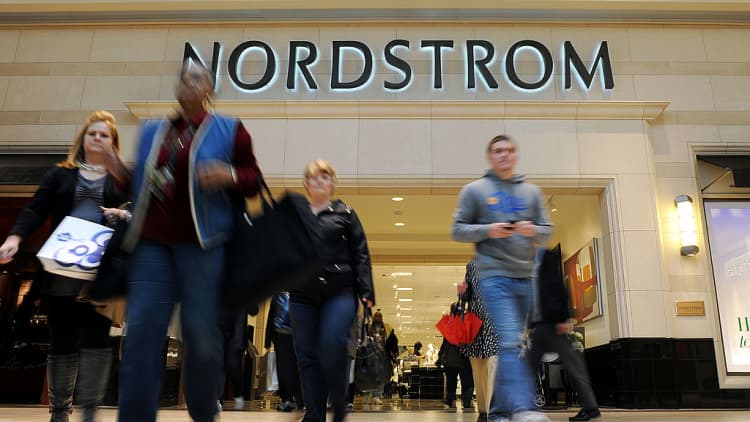
Nordstrom shares opened 5 percent higher Wednesday after CNBC reported a Nordstrom family group was closing in on a deal with a private equity firm to help take the department store private.
Nordstrom family members were close to choosing Leonard Green & Partners to help fund a buyout of the eponymous department store, people familiar with the matter said Tuesday.
Leonard Green would provide Nordstrom family members with roughly $1 billion in equity to help fund the deal, the sources said.
The family group, which owns 31.2 percent of the 116-year-old retailer, said in June it was looking to take Nordstrom private. It has since been looking for a private equity partner to help support the deal and also held talks with KKR and Apollo.
A deal between Nordstrom and Leonard Green has not been finalized, and other parties could make a move to disrupt the talks. It's also still possible talks could fall apart.
The family group is already talking to banks about raising $7 billion to $8 billion in debt to finance the deal and is hoping to submit a formal bid in the next couple of weeks, the sources said. Nordstrom has appointed an independent special committee to evaluate the offer.
Nordstrom has a market capitalization of roughly $7.7 billion.
Leonard Green has worked with Nordstrom before. The Los Angeles-based private equity firm has a stake in the British fast-fashion line Topshop, which has a partnership with the Seattle-based department store.
KKR and Apollo declined to comment. Nordstrom and Leonard Green didn't immediately respond to a request for comment.
The Nordstrom family is hoping that as a private company, Nordstrom will be able to make investments that help it adapt to the changing retail landscape without worrying about short-term shareholder reaction.
On Monday, Nordstrom announced it will roll out stores without merchandise, similar to concepts offered by e-retailers such as Bonobos and Warby Parker. Its stock slid as much as 5.4 percent to $43.59 on the news.
Other long-term initiatives for Nordstrom include investing in e-commerce, closing underperforming stores and investing in top locations, and expanding its successful discount shopping chain, Nordstrom Rack, according to a source familiar with the situation.
Still, a leveraged buyout of a department store is challenging in 2017. Several private equity backed-retailers have buckled under the weight of large debt loads that have hampered their ability to invest in e-commerce and adapt to the rapidly changing retail industry. Private equity-backed Payless ShoeSource and Gymboree filed for bankruptcy earlier this year, while Neiman Marcus is currently working with restructuring advisors.
Still, with the Nordstrom family likely to maintain control over the department store's operations, the potential deal to go private follows a different template than many of its peers.
Nordstrom has long been viewed as the jewel of the department store industry, with an affordable high-end price point that puts it between midtier Macy's and exclusive Neiman Marcus.
The company was quick to spot shoppers shifting to off-price retailers like TJ Maxx and Marshall's and put its efforts behind Nordstrom Rack, its own take on the category. Its investment into e-commerce helped it buck the industry trend last quarter of same-store sales declines.
Still, like all of its peers, it has seen its stock fall this year as investors question whether department stores can compete as shopping habits change.
Analysts were quick to point out that Nordstrom's unique track record and significant family ownership are likely to keep any potential deal to go private the exception rather than the rule.
"The structural challenges for the traditional department stores are abundantly clear today," wrote Gordon Haskett analyst Chuck Grom. "We don't foresee anything similar transpiring at Macy's, Kohls, and/or JCPenney, particularly since family ownership is virtually nonexistent.
Nordstrom operates 356 stores, including 121 full-line stores in the United States, Canada and Puerto Rico. Of those, 221 are Nordstrom Rack stores.
Its Seattle flagship location, modeled after famous European department stores, has restaurants, bars and pop-up shops. Nordstrom is also working on a flagship location at 217 West 57th St., near Manhattan's Central Park.


